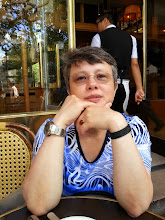"What Dreams May Come", by Vincent Ward, 1999, DVD, Uca
"What Dreams May Come", is Vincent Ward's free adaptation of Richard Matheson's eponymous novel (1978), starring Robin Williams, Annabella Sciorra, Cuba Gooding Jr and Max von Sydow. Short version: the movie is about the fairy-tale like life of Chris Nielsen and Annie Collins, and how after the two children, the husband and finally the wife died tragically, they all finally cope - can one say cope here? - in the after-life. Intrigued? I was, although I must say that this otherwise stunningly beautiful movie, fails to deliver the magic it seems to promise. Why? Let us look closer.
In "What Dreams May Come" which, by the way won four Oscars for - best visual effects, best production design, best blockbuster entertainment award and finally best international monitor award - we embark in some sort of metaphysical romance, with two main messages: 1/ love is eternal and 2/ death does not end anything. That is good news, isn’t it? To make his point real good, Vincent Ward relies heavily on the astonishing visual effects created by the Fuji Velvia (RVM) film stock, that are usually used for still photography of landscapes. If I wanted to be cynical about Ward's movie, I would say that - once he asserted his (Matheson's) belief about love and death, he pretty much ran out of original thoughts or hypotheses. At a deeper level, the whole movie can be viewed as a catalogue of intriguing theories or common beliefs, about the meaning of life, death and the after-life, only without an unifying thread. Well, you know, something that would make the whole experience more universal and less subjective And this is clearly the Achilles’ heel of "What Dreams May Come".
Despite the stunning and overpowering beauty of the scenery, the magic does not really work. Mind you, it has the fairy-tale atmosphere, the poetic view of human destiny, all the after-life scenic vistas - a special mention to Annie's purple Jacaranda tree- one can possibly wish for, and is never poor on emotional or spiritual melodrama. What went wrong then? Because the movie deals with universal matters: death, suicide, love, redemption, after-life, reincarnation and finally God ("He's up there somewhere, talking to us, hoping we could hear Him" says Albert/Cuba Gooding Jr to Chris/Robin Williams), I would have expected some ultimate truths to be disclosed, something to which all of us could relate. Sort of. When Chris died in a freak accident, he found himself bathed in some sort of painterly paradise light - which is in fact a visual recollection of Annie's impressionist paintings. There, he is told by Albert that he is the one who creates his own paradise, wills things, and finally that he is the one who can find grace or mercy. In short, heaven is in your mind, and if it is messy, then it is your mess.
Trouble in paradise? You are on your own! Where is God, where is the common ultimate revelation in all that? "In the city across the river, we have to have a common vision", says Leona (Rosalind Chao) to Chris. Unfortunately, it is nowhere to be found in this movie! What is left however, is the beauty of the journey itself - the ethereal visual imagery - , which admittedly could compensate for the blandness of the storytelling. Conclusion?. "What Dreams May Come" has the qualities of its faults. It's extremely beautiful and comforting - love is the winner, after all - but it is so fairy-tale like, you are never really in danger of buying it, or are you? Did I forget something? Ah, yes, I like Williams’ and Sciorra's performances. They both are very likable characters, and they made me terribly envious of the love they feel for each other. Perhaps, that is why I like "What Dreams May Come", despite its many flaws. It makes me feel good about being human. “It's not about not giving up”, as Chris/Williams said to Annie, it's about knowing why you're not".













No comments:
Post a Comment